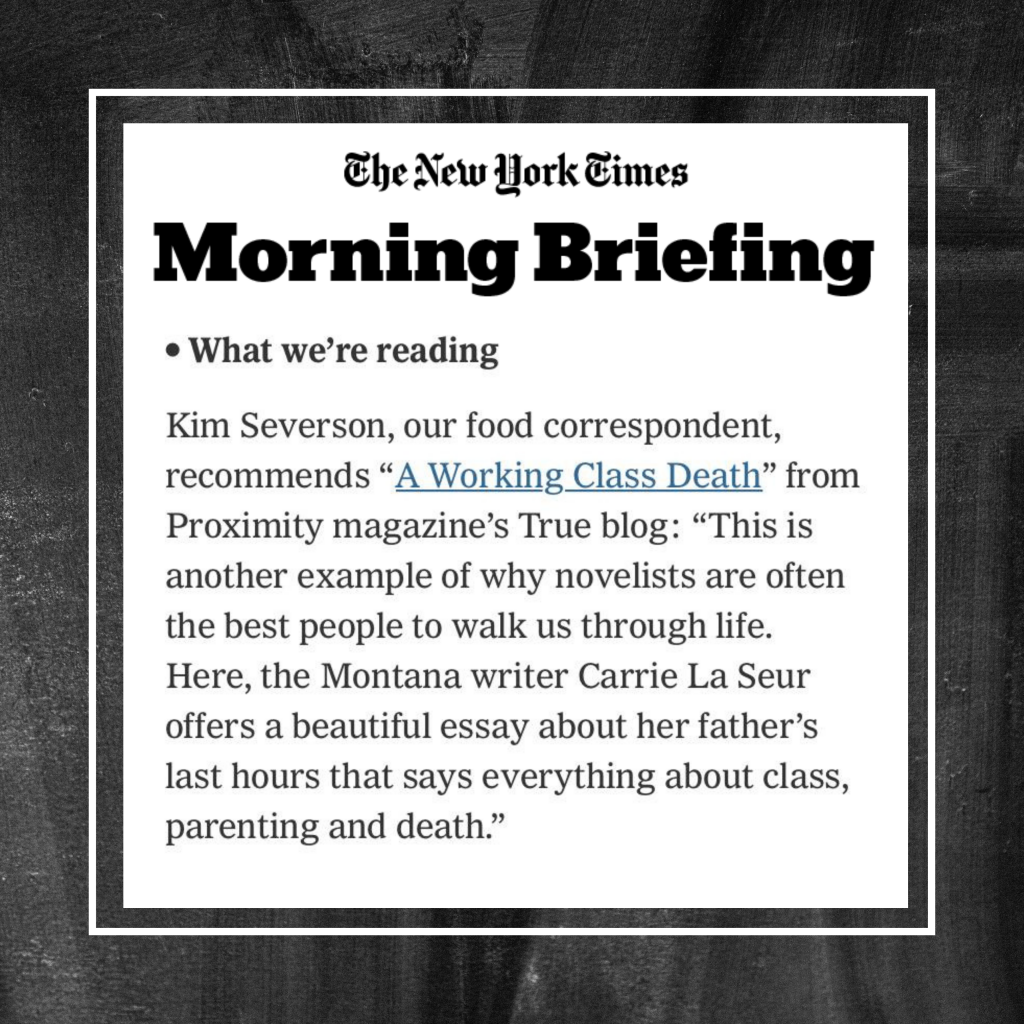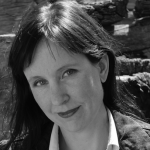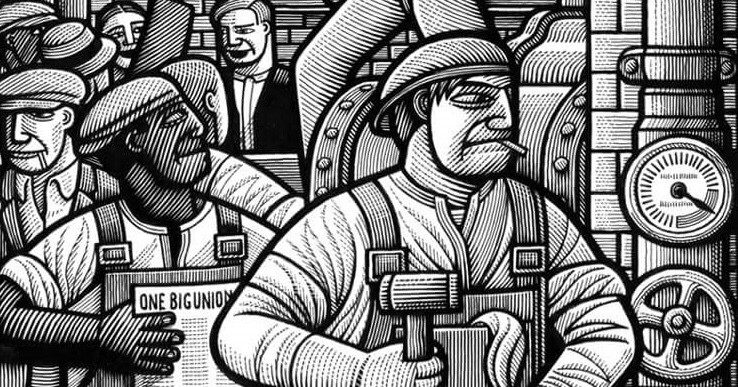I read “A Working Class Death” for the first time in a coffee shop. I took deep measured breaths to prevent myself from crying in public. My father was in a hospital that morning, many states away. Doctors were removing cancer discovered in his prostate and this was my first brush with a parent’s mortality. Though very different from Carrie La Seur’s essay about her own father, I was in awe of La Seur’s vulnerability, her courageous venture into discussing class in America, her reflections upon her care for her working-class father, and her climb from one class to another.
Despite being the focal point of many post-election think pieces, writing about class still feels like a fraught path. As a writer, I’m eager to plunge the depths of my experiences, those of my family, and the place I hail from for stories, but I’m hesitant. I’m from Appalachia—an eighth-generation West Virginian. Like droves of West Virginians in my generation, I moved away. Many in my family left the state for their education, but I’m the first to leave and not return. I’m also from a West Virginian family that historically had wealth and power, dwindling since its establishment generations ago, but still providing for us in the twenty-first century. This privilege allowed me a degree of financial freedom, of starting from a place where, in my state, many do not.
I now live in Wilmington, North Carolina, where Hurricane Florence hit land last September; I evacuated to my mother’s home in South Carolina. Hers is a grand home, enough to comfortably house six evacuees—my friends and neighbors—plus a cat and three dogs. My neighbor’s mother was shocked to hear we had a nice place to go. “I thought because Morgan was from West Virginia, she had faced hard times growing up.” It is strange to be from a state whose very name is synonymous with working class, almost interchangeable, if you attune to how the state is presented by the media. It’s hard to claim my state and not feel a little bit like a liar.

I brought up class when I introduced myself to La Seur over email, which was how we conducted our exchange. I’m from West Virginia, I wrote, but I’m not working-class. It felt like confessing a secret. Class felt like something I would never—and have never prior—used as an identifier. But Carrie’s essay made me feel eager to identify myself. It made me eager to explore my own complicated feelings on class, place, and identity, and how to render those true in prose.
Morgan Davis: I love the voice of this piece and the second person point of view. I found myself intimately engaged with the essay, inhabiting the hospital room and accessing the memories easily even though they weren’t mine. How did you choose the point of view? Did you write in first person and then revise?
Carrie La Seur: I recently read some of Sarah Smarsh’s body of work as background for my review of Heartland, coming in the Kenyon Review this spring. She does great things with second person. There’s one piece in particular that I remember about the lack of dental care when you’re living in poverty or—as was more the case in my upbringing—with a precarious hold on the lower rungs of the middle class. It gave me a way into the story about my dad. I’ve wanted to write about him for a long time but the way he died was so heartbreaking to me that I couldn’t get at it without writing something oppressively maudlin. I hope the essay succeeds in being honest about the raw emotion dredged up and also tells something true about how his life illustrates the experience of many Americans.
MD: To me, your piece reads in one way as a vulnerable self-portrait as well as a portrait of your father. What were your reasons for writing this and what challenges did you encounter while writing it?
CLS: It’s tough for me to write about where and whom I come from without hurting people. Many of them, my dad included, are or were terribly sensitive about being perceived as less than. When my extended family looks back on struggles, we tend to say things like “It wasn’t that bad” and shine up the tale. My grandma, who left school after sixth grade to support herself as a ranch hand and worked as a seamstress and factory hand much of her life, insisted in old age that she was working middle class, not working class. Aspiration can erase powerful histories.
I write fiction because I can tell stories without attaching them to real people. It doesn’t make the stories less true. Dad actually died in 2008, so I let it lie a long time. I didn’t mention “A Working Class Death” to any relatives outside my immediate family. A working man’s dignity is a delicate thing, and the ungainly scramble of that man’s daughter into higher strata can be painful to describe.
MD: Writing about your second novel, The Weight of An Infinite Sky, you said: “If I learned anything from this book it was to surrender myself to the process of writing rather than forcing outcomes on characters I didn’t know yet.” What do you mean by surrender, and do you feel the same surrender when writing an essay, especially about characters you know very well (ie, you and your father)? Are there other distinctions between your approach to writing fiction versus writing nonfiction?
CLS: I’m learning this lesson in a new and powerful way as I write my third novel, which is developing slowly and organically into linked stories about a twentieth century American leftist writer. Even with elaborate character backgrounds and research into historical events, the characters reveal themselves to me. They don’t feel invented; they feel discovered. With nonfiction I often just sit with an essay over days or weeks because when I come back to it I understand something new. The closer the subject matter is to my life, the tougher it can be to get at the truth. I hide things from myself so well. The revelations can be emotional. And creating space and time for them to rise to the surface is a real mental exercise. It’s easier to gloss over what’s stuck, keep it in that safe, deep place.
MD: As an angry young Democrat/woman/West Virginian, this paragraph is a real focal point in the essay for me, revealing even more about your father:
“Yet even as he experienced the setbacks that have turned many white men bitter and angry—and there was bitterness and anger enough—your dad hasn’t turned against his class. He’s a yellow dog Democrat who’s voted and argued all his life for the honor and rights of the working man, the laborer, the veteran against forces that would crush them.”
There are some interesting assumptions, perhaps, about the working class and the forces that crush them. Mostly, that the men who have turned out to support the current GOP in droves are turning against their class. I wonder if you might speak to your interest in the working class and politics, why your father remained a yellow dog Democrat, and the importance of including this detail in the essay.
CLS: I commented on Dad’s politics because I always found them really interesting. He was born and raised in Montana, where there’s a tradition of a strong Democratic party going back pre-statehood, when Southern Democrats fled the devastated South in the Civil War and Reconstruction era. Over generations, those socially conservative, populist voters have mostly flipped Republican. Not Dad, maybe because he belonged to a union like his father before him, but also because he was educated. He read more than the average person and never changed his view of the Republican Party as fat cats who would always steal from working people to increase profits. In a modest way he had a class-consciousness that’s rare in modern America. The irony is that he obtained it by rising a little above the class he was born into. It took book learning to wake him.
In college on the east coast I had a brief flirtation with conservative politics because it felt closer to the environment I was raised in out West, but I quickly realized how uncomfortable I was with the policies I was hearing. It was so top down class-wise, with a lot of embedded misogyny and race antagonism. I thought, “I can’t go along with this.” Again, education was vital. Until we reemphasize critical thinking and reading skills in American schools—History! The arts!—the politics of shortsightedness will prevail.
MD: So much of your writing is set in Montana and it seems as if this landscape and environment is crucial to your identity and work; yet it’s absent in this essay, though a sense of a working-class place permeates the essay. When do you chose how to include place in your writing—are there drafts where Montana specifically appears for this particular piece?
CLS: Montana is the subtext of this essay. How do you get to be a young man who doesn’t have college as an option to avoid the Vietnam era draft? Grow up poor in Montana. How do you develop a sense of the strength of the people, the importance of hanging together through devastating circumstances? Grow up poor in Montana. How do you learn that what a daughter needs is the ability to bait a hook, change a tire, shoot a .22 and throw a punch? It could be many places, but in our family it was Montana that made us all these things.
I was raised on a strain of Americana that’s gone from a lot of the country but persists in small places, rural places, where people haven’t fully bought into the me-first consumer culture we’ve been so comprehensively sold or frankly can’t afford it. Other things matter here. Do you tell the truth? Are you a jackass about unimportant things or do you cut people slack as needed? Do you show up for your neighbor? Do you respect heritage and the land you live on? Do you keep your promises? There’s greatness in that, and not the kind that’s sold on red hats made in China.
MD: Tell me about your piece’s title. Did you title it? Were there other options? The title serves as the readers’ first encounter, and it potentially establishes a distance, general vs. specific, which then gets played with in the second person perspective. I’m thinking about how different it would be if it were “My Father’s Working Class Death” or “Your Father’s Working Class Death.” Can you tell me about this choice? When did the title come to you in the writing process?
CLS: It’s my title. I wanted to emphasize class as a category, get people thinking in terms they don’t usually use, then make it personal fast with the second person. Class isn’t something out there, it’s right here in you, more powerful for the fact that normally you don’t see it. Maybe it’s the fact that I lived in the UK for several years, doing a graduate degree in one of the most class-conscious places on the planet, or my own dramatic class shift, but class fascinates me. It’s the untold American story. Bit by bit, byte by byte, I’m figuring out ways to tell it.

CARRIE LA SEUR is the author of 2 critically acclaimed novels from William Morrow: The Home Place (2014) and The Weight of an Infinite Sky (2018). She’s a Rhodes Scholar and a graduate of Oxford University and Yale Law School. Only one of her grandparents attended high school. Her poetry, short stories, essays, and book reviews appear and are forthcoming in publications including the Guardian, Inscape, Kenyon Review, Mother Jones, Rappahannock Review, Rumpus, and Salon. She’s an alumna of the Sewanee Writers’ Conference and the Iowa Writers’ Workshop summer session and will attend the 2019 Tin House Winter Workshop for novelists.

FREDERICA MORGAN DAVIS earned her MFA in Fiction from the University of North Carolina Wilmington. There she served on Chautauqua Journal’s editorial staff as proofreader and podcast host, staffed Ecotone Magazine, interned for Lookout Books, and co-directed the Young Writers Workshop. She is an alumna of Lit Camp, Tin House, and One Story summer writing workshops and the Bread Loaf Environmental Writers Workshop. Her stories have placed in the Top 25 for Glimmer Train’s Short Story Award for New Writers and been a finalist for the Doris Betts Fiction Prize.



